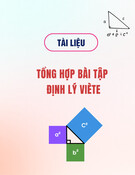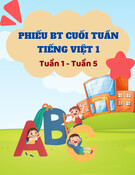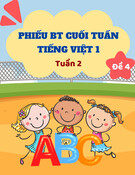
Thang Long Secondary School
ENGLISH REVISION FOR THE SECOND SEMESTER – GRADE 7
(School year 2019-2020)
* From Unit 7 to Unit 10
I. Vocabulary
To talk about obeying traffic rules. Identify road signs. Words about film stars
Words about popular festivals Types and sources of energy
II. Grammar.
-Tenses: Present/Past simple / Used to/ Present continuous/ Future simple / future continuous /
Present perfect
-ed and –ing adjectives
- Connectors: although, despite/ in spite of, however, nevertheless
- H/Wh-questions (Review)
- Adverbial phrases
- Passive sentences
- Comparatives and superlatives
III – Phonetics :
Stress of two / three - syllable words
Sound: /e/ /ei/ / t/ /d/ /id/
III. Skills
1. Listening: KET
2. Reading: Reading texts in textbook / work book / KET
3. Writing: Rewrite the sentences without changing their meaning...
4. Speaking:
Topics :
What must we do to have road safety ? (1 minute – 2 minutes)
Evaluation Criteria:
Content: 0.8 point
Fluency: 0.4 point
Accuracy: 0.4 point
Body language; 0.4 point
PRACTICE
PART A: PHONETICS
I/Choose the word which is pronounced differently from the others.
1. A. kissed B. closed C. watched D. laughed
2. A. pavement B. indicate C. passenger D. statement
3. A. head B. great C. death D. bread
4. A. worked B. stopped C. forced D. wanted
5. A. kissed B. helped C. forced D. raised
6. A. confused B. faced C. cried D. defined
7. A. devoted B. suggested C. provided D. wished
8. A. catched B. crashed C. occupied D. coughed
9. A. agreed B. missed C. liked D. watched
10. A. measured B. pleased C. Distinguished D. managed

II/ Find the word which has different stress pattern.
1. A. dangerous B. plentiful C. exhausted D. limited
2. A. abundant B. available C. convenient D. harmful
3. A. consumption B. environment C. advantage D. electricity
4. A. damage B. replace C. pollute D. provide
5. A. hilarious B. violent C. interesting D. excellent
PART B: VOCABULARY & GRAMMAR
I/ Choose the best answer.
1. Does your bike ever ___________ down on the way to school?
A. break B. take C. do D. turn
2. I ___________ go on foot when I was in primary school.
A. have to B. used to C. can D. may
3. Give a ___________ before you turn left or right.
A. sign B. turn C. sound D. signal
4. A lot of dancers go to Rio de Janeiro to ___________ the Rio Carnival.
A. join B. perform C. attend D. appear
5. I had to stand in the balcony to catch the whole ___________ of the parade.
A. view B. picture C. sight D. vision
6. Everybody attends the festival ___________ fun.
A. with B. for C. in D. of
7. On Thanksgiving, families and friends ___________ to have a feast.
A. meet B. arrive C. gather D. appear
8. The end of the film was so ___________.
A. moved B. moving C. move D. moveable
9. Although they spent a lot of money on the film, it wasn’t a big ___________.
A. success B. failure C. performance D. show
10. She enjoy teaching young children, but it is often a very……………………job.
A. exhaust B. exhausted C, exhausting D. B and C
11. We __________ to school two years ago. Now I go to school on foot.
A. used to cycle B. cycled C. was cycling D. went
12. My father used to go to work by motorbike. Now he __________.
A. cycled B. was cycling C. cycles D. used to cycle
13. __________ the film is a bit frightening, I really enjoyed it.
A. However B. Nevertheless C. Although D. Despite
14. __________ the silly story, many people enjoyed the film.
A. In spite of B. Although C. However D. Nevertheless
15. The film didn’t receive good reviews from critics. __________, many people saw it.
A. Although B. In spite of C. Despite D. However
16. We will go on holiday with some friends of __________.
A. our B. ours C. us D. we
17. A friend of __________ is coming to stay with me next month.
A. me B. my C. I D. mine
18. Careless driving __________ accidents on the road.
A. will cause B. have caused C. is causing D. is going to cause
19. Look at the photo! You’re……………………a horse.
A. driving B. flying C. riding D. sailing
20. I usually read book books while I am…………………..a train.
A. in B. on C. by D. at
II/ Find out one mistake in each sentence then correct it.
1/ The most common traffic problem in city around the world is traffic jams.
A B C D

2/ Thanksgiving is traditional celebrated with a feast among family and friends.
A B C D
3/ Villagers voluntarily contributing money and other things to celebrate the festival.
A B C D
4/ The film is about the sinking of the ship Titanic on their first voyage.
A B C D
5/ Tom Hank is one of the most famous actor in Hollywood.
A B C D
PART C: READING
I/ Put the word from the box in each gap to complete the following passage.
Kerosene of daylight earn opportunity both education light from modern education
It’s hard to imagine (1) …………..without energy. Without energy, people’s ability to get a decent
education is severely affected. Education is acknowledged as a crucial factor in helping people escape (2)
…………. poverty. In communities without energy children are often forced out of school to help collect
cooking materials or (3) ………….money. When they do go to school it has to be in (4) ……………, with
restricts their hours especially as many children walk for hours to get there. When they arrive home to do their
school work, they have no (5) …………… to study and all that greets them is darkness. Or they have to rely
on (6) ………..to provide precious light, which is (7) ………………expensive and dangerous; if a lamp is
knocked over it can cause serious burns. Computers, radios or TV are important tools in the (8) …………….. .
A lack (9) …………..electricity restricts the (10) ……………for children to further their education. And
teachers don’t want to work in communities where there are no lights, little equipment, no TVs, computers or
life after dark.
II/ Read the text and answer the questions.
URBAN TRANSPORT PODS
The people living in Milton Keynes, a town about 70 kilometres northwest of London, have been
introduced to a new transport experience when they use “pods” to travel on certain routes.
The pods are a kind of driverless cars which travel at 19km/h and are able to transport two people and
their luggage. There is a touchscreen in windshield of the pods where passengers select their terminal. During
the trip they can also read the news, check emails or play video games on the screen. Powered by electric
motors, the pods have ultrasonic sensors and a GPS system that help themselves know where they are going
and how to avoid obstacles along the way. People can use a smartphone app to hail a pod in the street.
Do you think this way of transport will appear in cities in Viet Nam soon?
1.Where is the project introduced?
..........................................................................................................................................................................
2.What can passengers do with the touchscreen?
..........................................................................................................................................................................
3.Are pods a type of robot cars?
..........................................................................................................................................................................
4.What enables pobs to know where they are going and how to avoid obstacles?
..........................................................................................................................................................................
5. Why should you need the smartphone app for pods?
..........................................................................................................................................................................
PART D: WRITING
I. Rewrite the following sentences so that their meanings stay the same, using the word given for each.
1. The distance from Ho Chi Minh City to Phu Quoc Island is about 300 km.
=> It……………………………………………………………………………………………………
2. How far is it from your house to the school?
=> What…………………………………………………………………………………………………
3. Mr Tam went to work be car some years ago, but now he cycles.
=>Mr Tam used………………………………………………………………………………………..
4. My mother washed clothes by hand in the past, but she no longer does it now.

=>……………………………………………………………………………………………………….
5. This wet weather is so depressing.
=> This wet weather makes…………………………………………………………………………….
6. I feel very relaxed when I see a romantic comedy.
=> Seeing………………………………………………………………………………………………..
7. The film was really interesting to me.
=> We are……………………………………………………………………………………………….
8. Have you got any bigger than that one?
=> Is this………………………………...?
9. Her old house is bigger than her new one.
=> Her new house…………………………………….........
10. No one in my class is taller than Peter.
=> Peter ……………………………………………….
11. The black dress is more expensive than the white one.
=> The white dress ……………………………………………
12. According to me, English is easier than Maths.
=> According to me, Maths ………………………………….
13. No one in my group is more intelligent than Mary.
=> Mary ……………………………………………………….
14. Mount Everest is the highest mountain in the world.
=> No mountain ……………………………………………...
15. This is the first time I have ever met such a pretty girl.
=> She is ……………………………………………………..
III/ Change the sentences into passive voice.
1. They will build a new school for poor children next month.
=> A new school ...............................................................................................................................................
2. They sell these chemicals everywhere in my hometown.
=> These chemicals...........................................................................................................................................
3. Some people will interview the new president on TV.
=> The new president ......................................................................................................................................
4. Road user should obey traffic rules strictly.
=> Traffic rule .................................................................................................................................................
5. He took me to the airport in his car.
=> I .................................................................................................................................................................
IV. Rewrite sentence using the word given as suggestion:
1. Although she has a lot of money, she does not have a happy life. IN SPITE OF
2. Although it rained, they still go fishing. DESPITE
3. Although she works hard, she doesn’t get good results. HOWEVER
4. Although the exercise is difficult, she can do it easily. NEVERTHELESS
5. He got a good job but he was not satisfied. ALTHOUGH
6. I last phoned her last Sunday. HAVEN’T
7. She began to live here a long time ago. HAS
8. Your class has more students than mine. FEWER
PART E: SPEAKING
SPEAKING TEST 1
Part 1: Greetings and answer the teacher’s questions about TRAFFIC
1. How do most people in Viet Nam travel to work?
2. Is there any traffic problem in Viet Nam? What is it?
3. Can you suggest a way you think can improve the traffic situation in Viet Nam?
4. What should we do to have road safety for pedestrians ?

Part 2: Information Exchange
Each of you will now receive a card. On the card there is a picture and clues for five questions. You
should use the words to make questions and ask your friend. Your friend will answer the questions
based on the picture he/she has.
CARD A :
Ex. 1: Use the words given below to make
questions. Ask your friend about his/her
picture and listen to the answers.
Ex. 2: Now, your friend will ask you questions about your
picture. Answer his/her questions.
1.What/see/picture/?
2.Where/she/?
3.How/look/?
4.What/happen/?
CARD B :
Ex. 1: Use the words given below to make
questions. Ask your friend about his/her
picture and listen to the answers.
Ex. 2: Now, your friend will ask you questions about your
picture. Answer his/her questions.
1.What/see/picture/?
2.Where/they/?
3.What/they/do/?
4.What/happen/?




![Bài tập so sánh hơn và so sánh nhất của tính từ [kèm đáp án/mới nhất]](https://cdn.tailieu.vn/images/document/thumbnail/2025/20250808/nhatlinhluong27@gmail.com/135x160/77671754900604.jpg)
![Tài liệu tham khảo Tiếng Anh lớp 8 [mới nhất/hay nhất/chuẩn nhất]](https://cdn.tailieu.vn/images/document/thumbnail/2025/20250806/anhvan.knndl.htc@gmail.com/135x160/54311754535084.jpg)




![Tài liệu Lý thuyết và Bài tập Tiếng Anh lớp 6 [Mới nhất]](https://cdn.tailieu.vn/images/document/thumbnail/2025/20250802/hoihoangdang@gmail.com/135x160/18041754292798.jpg)





